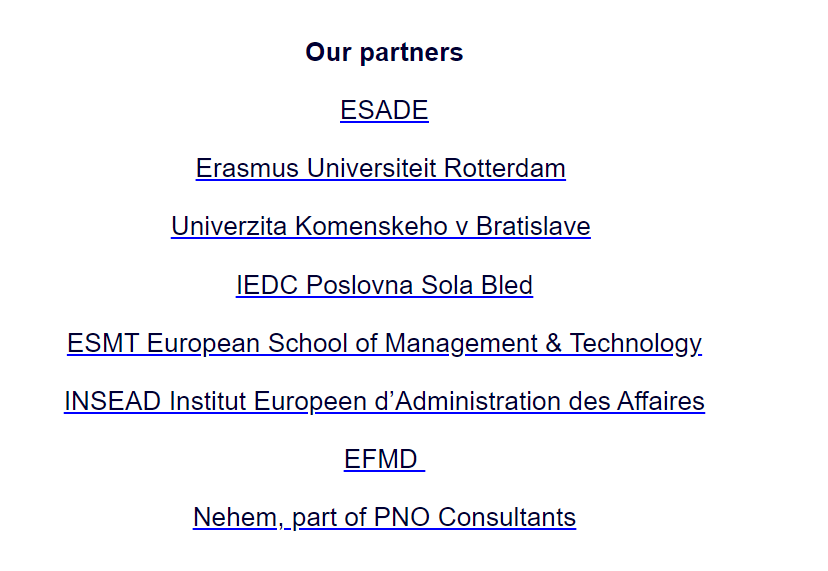Mid-year review
Before wishing you happy summer holidays, let’s catch up with the last six months of EQUAL4EUROPE.
Welcome to the members of the new Gender Equality & Diversity Officers Network!
The Gender Equality and Diversity Officers Network (GE&DO) is now on LinkedIn.
The Network offers the space to share resources, ideas, experiences and connect with other experts and stakeholders interested in Gender Equality and Diversity in research performing institutions. Very soon, we will launch a newsletter dedicated to the Network so that all the members are updated and can join the activities, even if they are not connected via LinkedIn.
For the upcoming newsletters, please write to equalforeurope@esade.edu. For more information on the network…continue reading!
EQUAL4EUROPE TRAININGS AND INITIATIVES

Gender Equality and Diversity Officers Network
The EQUAL4EUROPE project is pleased to announce the creation of the Gender Equality and Diversity Officers Network (GE&DO Network).
The Network uses a dedicated LinkedIn page as the space to share ideas, best practices, information on how to ensure and promote Gender Equality in research performing organisations and opportunities for collaborations. It consists of members from around Europe, namely Gender Equality and Diversity Officers, advisors and experts from universities and research centres.
Knowledge shared on the Network, including the research results of the EQUAL4EUROPE project, is useful in the everyday practice and for more studies in the field of gender equality and diversity.
The Network will connect with similar national initiatives in the EU and relevant
organisations such EFMD and CEEMAN, while it will remain active also after the end of the EQUAL4EUROPE project.
To access the Gender Equality and Diversity Officers Network on LinkedIn, please click on this link.
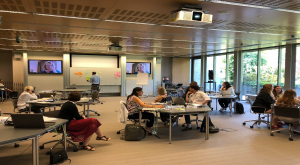
Equality and Diversity Beyond Numbers: Structural, Organisational, and Cultural Changes in Higher Academic Institutions – Workshop and Consortium Meeting
The EQUAL4EUROPE consortium meeting was held at IEDC-Bled School of Management in Bled, in Slovenia on 27-28 June. The meeting concentrated on the partners’ progress in implementing the Gender Equality Plans (GEPs) and the structural changes the partners pursuit at their institutions.
The first day, Prof. Susan Madsen, one of the top global thought leaders on the topic of women and leadership, delivered 3 thematic sessions and walked us through the steps for planning for institutional, structural and cultural changes:
- Gender Equality Plans: Opportunities to Propel the Work Forward
- Changing Organisational Cultures: Sexism, Stakeholders, and Systems
- Seeking Deeper Impact: Beyond the Checklist
The second day, Prof. Mark Smith, Director at University of Stellenbosch Business
School and Prof. Oľga Pietruchová, expert in the field of Gender Equality, shared with the partners their analysis and ideas on how:
- The GEPs can help promote more equal business schools
- The impact that COVID had on the faculties
- Barriers and long terms solutions to fight inequality
For more information on the content of the workshops get in touch with us via our LinkedIn page, Twitter or our Website!
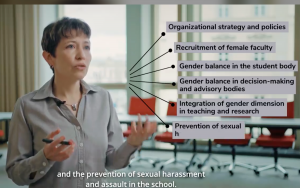
Gender Equality Plan by ESMT Berlin
The GEPs are approved! More information coming soon but in the meantime, you can check out the wonderful video from our partner ESMT Berlin!
ESMT Berlin has developed a GEP as part of the EQUAL4EUROPE project. The plan, which will be implemented by the end of 2025, promotes gender equality among staff in academic careers and administration, as well as among students.
More information on the GEP can be found here
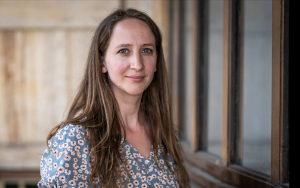
Gender Equality Plan by Comenius University
Andrea Fábiková, a member of the Comenius University team, recently gave an interview to a national newspaper about the fight against sexism and sexual harassment. The GEP of the Comenius University was adopted at the end of 2021 and is a tool that can help address this situation.
In her interview Andrea summarised these measures, which are currently in the
preparatory phase:
- The development of a document that will define sexual harassment and
comprehensively describe how to deal with it (exactly what to do, what to expect in each scenario, and what the outcome will be). - Establishing the “trusted person”, represented by one woman and one man from the university (but not people from the higher hierarchical structure). They will not investigate specific complaints; rather, their role will be advisory and accompanying
(e.g., they will help the harassed or harassing person to write and file a formal complaint or to contact the dean or dean’s office). An external person will also be available for such cases. - Information about sexual harassment will be included in the initial meetings with students upon entering a programme.
- Information leaflets on how to deal with harassment will be distributed in the premises of the University. The University will also disseminate such information on social media.
- An open-door policy is also being considered. This means that if, for example, a student and a lecturer are in a pair consultation, they will not be able to have it behind closed doors.
- Several other activities are also organised to raise awareness about gender equality, the use of gender-balanced language, the integration of a gender-sensitive approach in the classroom, etc. in relation to the problem of sexism and harassment.
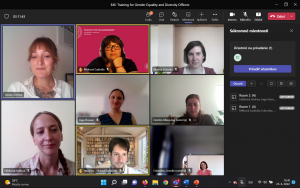
Training Workshop for Gender Equality and Diversity Officers on
Gender Equality, Communication and Resistance
The workshop took place the 23rd of June and was organised to support the
implementation of the GEPs by the partner institutions. Participants in the training were Gender Equality and Diversity Officers and other staff members directly involved in the implementation of GEPs.
The session was facilitated by Timea Crofony, an expert in gender equality who herself has and experience as gender equality coordinator. The workshop consisted of two parts:
- Firstly, the role of Gender Equality and Diversity Officers was discussed, addressing questions such as what are their tasks and competencies, what should be their level of autonomy and what are the prerequisites for taking up this role.
- Second, an interactive discussion was dedicated on how to communicate and overcome resistance while implementing a GEP.
The activities dedicated to the Gender Equality and Diversity Officers will continue in early Autumn 2022, with a series of knowledge sharing sessions focusing on practical implementation. The first session will focus on the measures and policies to prevent and respond to sexual harassment.
More information about the knowledge sharing session will be announced soon via our LinkedIn page, Twitter or our Website!
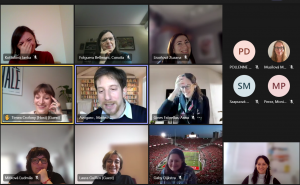
Gender in Research and Teaching for Future Trainers and Researchers
EQUAL4EUROPE celebrated “The International Day of Women and Girls in Science” and organised a training on “Gender in Research and Teaching”. Two experienced trainers and researchers and 12 future trainers discussed the best ways to make change happen. And as one participant put it…it was a leaky pipeline of fun.
For more information on the content of the training get in touch with us via our LinkedIn page, Twitter or our Website!

How to formulate a salutation in an email?
How to avoid overusing generic masculine?
How to communicate in an inclusive and balanced way?
Answers to these questions were offered in a workshop at Univerzita Komenského v
Bratislave on the 6th of June 2022. The workshop was attended by members of
the EQUAL4EUROPE team and people involved in the implementation of the GEPs at the university.
The discussion was led by Jana Cviková and Lucia Molnár Satinská, experts in linguistics and gender studies. The workshop offered various tips and tricks on how to achieve gender-balanced communication both inside and outside the institution.
The group also reflected on subconscious stereotypical beliefs about gender roles and the different abilities and attitudes of women and men and discussed practical examples of how communication can positively shape and cultivate our thinking as well.
Following the close circle meeting, a workshop for a wider group of researchers from Univerzita Komenského v Bratislave is planned for the autumn.
More information will be announced soon via our LinkedIn page, Twitter or our Website!
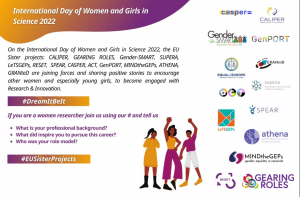
International Day of Women and Girls in Science 2022
EQUAL4EUROPE joined forces with the sister H2020 projects and launched an awareness campaign on the International Day of Women and Girls in Science 2022, to encourage other women to pursue STEAM carriers!
You can still follow our hashtags #DreamItBeIt #EUSiterProjects and find out a lot of inspiring stories from the incredible women in our project!

International Women’s Day
On the 2022 International Women’s Day, 19 H2020 projects that support gender equality in research and innovation, joined forces in a thread to explore what we can all do in order to achieve gender equality!
Find the thread here and follow all the incredible activities that the sister projects are doing in raising awareness.

Dianne Bevelander Memorial Fund
Over three decades at Erasmus University Rotterdam (RSM), the late Professor Dianne Bevelander put gender balance, equality and diversity firmly at the top of the agenda – not just in Rotterdam but across the international business and academic community.
As Dianne said herself: amplification is key. That spirit that led her to establish the Erasmus Centre for Women and Organisations (ECWO) in 2014 as a standalone centre within RSM. ECWO works to understand, support, advise and advocate for and on behalf of women in
organisations, and to help change the face of organisations everywhere.
Now thanks to seed funding gifted by the Bevelander Family and with your support, the Dianne Bevelander Memorial Fund will build upon the work that Dianne started – amplifying new generations of fearless women in her memory.
Find the official website of the fund here.

In March 2022 our partner Hanneke Takkenberg, Professor of Management Education, Rotterdam School of Management, Erasmus University (RSM), participated in an article written by Matt Symonds, Contributor, Co-Founder Fortuna Admissions & CentreCourt
MBA Festival; The S of QS and was published on Forbes.
The article titled “11 inspiring women in higher education highlight key challenges women face in the workplace” saw the participation of eleven higher education professional who tackled the problem of the obstacles women still find in the workplace.
Professor Hanneke Takkenberg, citing the work of the EQUAL4EUROPE spoke about the lack of the feeling of inclusion and argued that gender equality at work involves an entire organisation while “…it is only through this that you can create the systemic change that makes the most of diversity and inclusion’s added value in the areas of innovation, technology and sustainability.”
Check the full article on FORBES
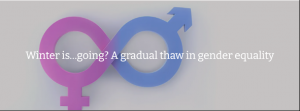
In January 2022, Anna Ginès, Associate Professor at ESADE and Victoria Cochrane,
Associate Director for Research at ESADE Business & Law School, shared our partners’ progress and experiences while implementing the GEPs in an article published by the EFMD Global Focus.
The article argues that through their research and education programmes, business schools play a significant role in informing the business practices and tomorrow’s leaders and influencers. However, the research undertaken but the EQUAL4EUROPE project show that there is a lot more that could be done to improve gender equality.
Read the article on Global Focus.
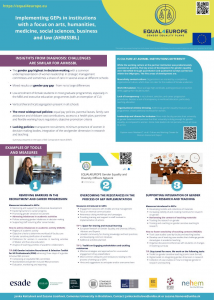
Implementing GEPs in institutions with a focus on arts, humanities, medicine, social sciences, business and law (AHMSSBL)
On 26 and 27 April, Zuzana Lisoňová, from Univerzita Komenského v Bratislave, attended the “Let’s co-produce gender equity knowledge together” event in Aveiro, organized by our sister project CHANGE.
For more information on the project CHANGE, click here
EQUAL4EUROPE Research results and public deliverables

New material published on our website!
Are you interested in a tool to monitor the process of setting-up GEPs in your institution? Then check out the EQUAL4EUROPE ‘s Tracking Tool for Gender Equality Plans prepared by ESADE.
Who can use this material: All those interested in monitoring the process of setting-up GEPs. In this Excel-file, the setting-up process has been divided in 4 block: (i) Preliminary steps for adopting a GEP; (ii) The negotiation process; (iii) Designing the GEP; and (iv) Dissemination and engaging key stakeholders.
Find the tool on our website.

What’s next?
Our partners have adopted the Gender Equality Plans! We will soon start sharing details on our partners’ experience, success stories and lessons learned. Stay tuned for
interesting materials and inspiration for your work in your institution…
More activities and opportunities to learn from our GE&DO Network. Stay tuned via the LinkedIn page of the Network. You don’t have LinkedIn but you want to participate? Write to: equalforeurope@esade.edu
More research results and deliverables are coming the next months and more opportunities to learn from our trainings and knowledge sharing sessions!

